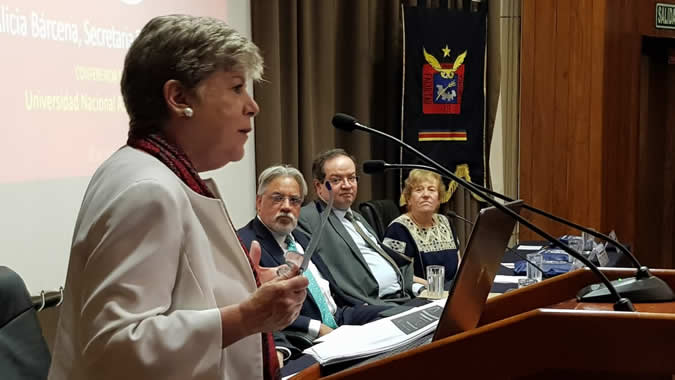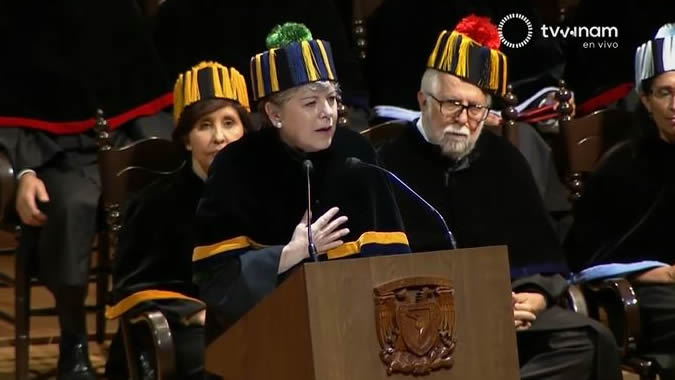Alicia Bárcena Reinforces Call to Promote Structural Change for Equality and Environmental Sustainability in the Region
Work area(s)
ECLAC’s Executive Secretary gave a keynote lecture today at the National Autonomous University of Mexico, in which she urged for creating new social compacts and reworking the conversation between the State, the market and society.

The Executive Secretary of the Economic Commission for Latin America and the Caribbean (ECLAC), Alicia Bárcena, reinforced today her call to promote structural change for equality and environmental sustainability in the region and urged for creating new social compacts and reworking the conversation between the State, the market and society.
The senior United Nations official and Doctor Honoris Causa of the National Autonomous University of Mexico (UNAM) gave a keynote lecture today at that educational institution’s School of Economics, entitled “Change of era and a new development model: The structuralist interpretation”, in which she affirmed that the disenchantment and anger in the region represents a breaking point with regard to the continuance of a model associated with three decades of wealth concentration and environmental deterioration, with insufficient growth.
“We are not the poorest region, but we are the most unequal one. Our production structure is a great factory for inequality. Inequalities have undermined the social contract and democracy. We need compacts between the State, the market and society,” she sustained.
She recalled that Latin America and the Caribbean is a region characterized by a culture of privilege, which is the legacy of our colonial past, and which naturalizes social hierarchies and enormous asymmetries in access to the fruits of progress, political deliberation and productive assets.
“The culture of privilege naturalizes inequalities, discrimination and it addresses equity, and not equality, with a welfare-oriented approach rather than one of empowerment,” Alicia Bárcena said.
She stated that for a decade, ECLAC has been positioning equality as the basis of development and as an unflagging ethical principle, centered in a rights-based approach.
Furthermore, she underscored that the old development paradigm is insufficient. It is not enough to just grow; we must grow to equalize and equalize to grow, she said.
In her remarks, the Executive Secretary of the United Nations regional commission indicated that, in addition to its intrinsic value, equality has an instrumental role to play as the driver of sustainable development, contributing to innovation, increased productivity and environmental sustainability.
She added that equality is not just a result of the economic system; it is also a variable that explains its long-term efficiency. Equality, productivity and democracy are complementary strategic goods (and not substitutes for one another), even more so in a world with sharp economic, political and environmental tensions, she noted.
Alicia Bárcena stated that the international community has undergone a learning process and has arrived at the consensus that the new development paradigm should not only target income convergence but also the closing of social gaps using a rights-based approach. In addition, it must respect the planet’s limits and be aware of the dangers posed by environmental destruction stemming from human activity.
“If the destruction of the environment is the main physical threat to the continuance of development, inequality is its main obstacle or political threat,” she emphasized.
She added that climate change is the biggest market failure of all times, but we have to address it and we have to do so today. “We must move our economy towards a big push in favor of sustainability,” she said.
Furthermore, she stressed that the region faces three gaps: that of external equilibrium, social equilibrium and environmental equilibrium.
“To close these and achieve converge between their growth rates, a new political economy is needed along with a global compact,” she concluded.
Related content

Alicia Bárcena is Awarded an Honorary Doctorate by the National Autonomous University of Mexico
In her speech, ECLAC’s Executive Secretary called for forging alternative paths and societal projects in which citizens are the subject, not just the object, of transformations that improve their…
Subregional headquarter(s) and office(s)
Country(ies)
- Latin America and the Caribbean
Contact
Public Information Unit
- prensa@cepal.org
- (56 2) 2210 2040